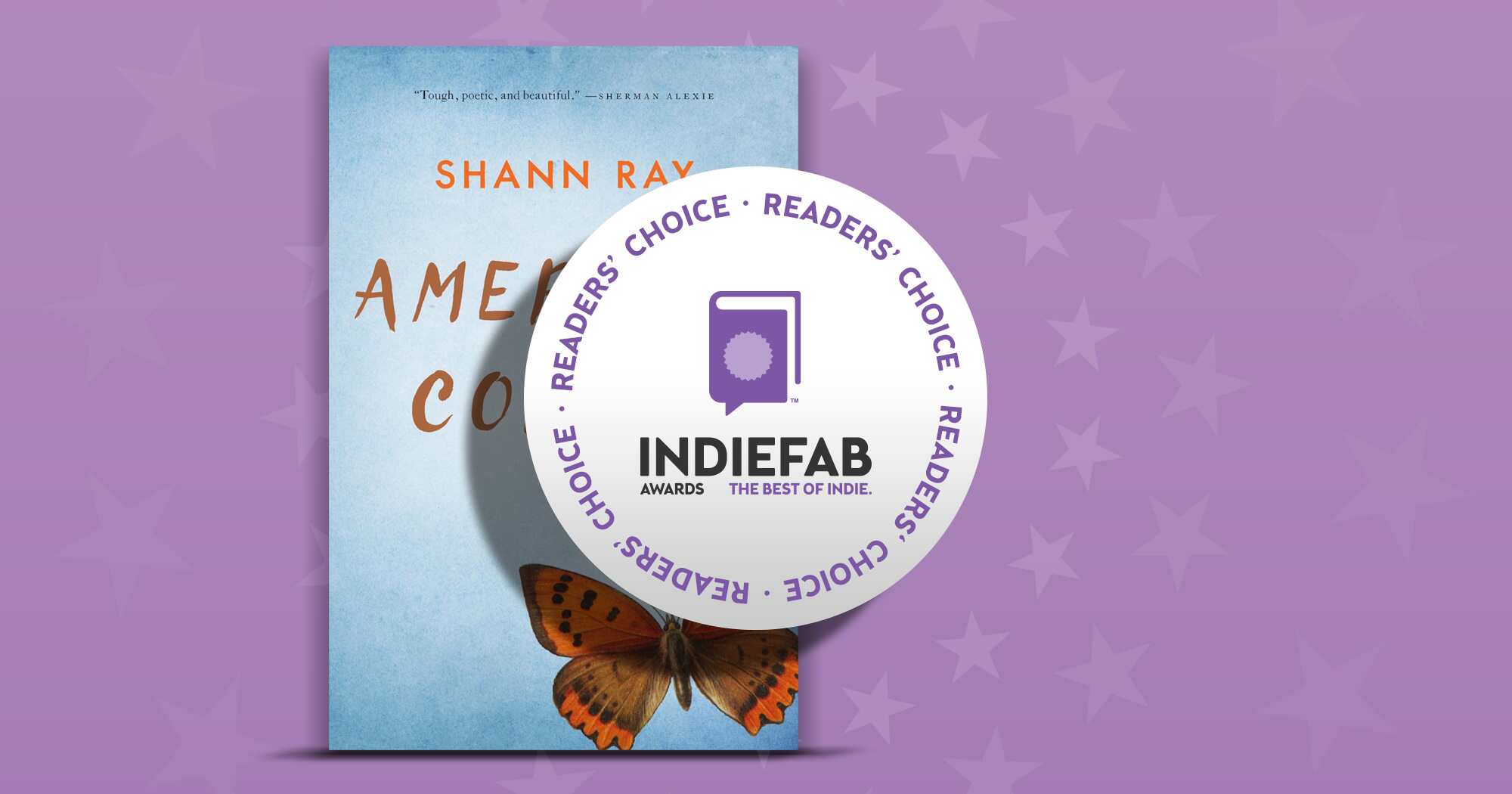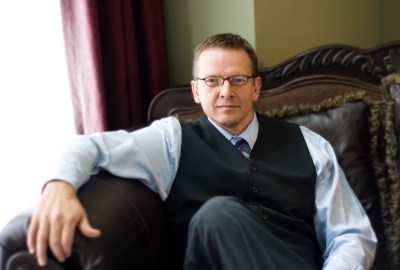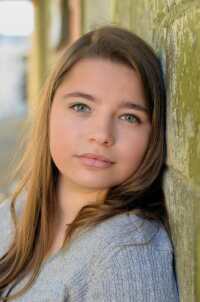Readers' Choice Award Goes to Debut Author's Epic Story Set in Montana

It’s almost time to announce our 2015 INDIEFAB Book of the Year Award Winners, but this year we decided to add a bit more fun with a new, unofficial category: the Readers’ Choice Award. We asked all our readers to vote for their favorite book by either commenting on our website, Facebook, or Twitter with the hashtag #INDIEFABFAVE. And boy, did you all deliver. Several books racked up hundreds of comments, all with lots of wonderful things to say about their INDIEFAB faves.
So, while our other INDIEFAB winners will be announced at the American Library Association’s Annual Conference in Orlando, Florida, at 4 p.m. June 25, we are announcing the Readers’ Choice Award now. Our winner is American Copper by Shann Ray. I got the chance to ask Shann some questions about his novel, his homestate of Montana (also the setting of his epic debut), and basketball.
Your website bio says you teach at Gonzaga University. It also mentions your career as a professional basketball player. These seem to be very separate ends of the spectrum. Can you tell me about how you came to both of these paths in life and whether they inspired or influenced the other?

Shann Ray
I grew up in Montana where basketball is like lifeblood. My dad was my high school basketball coach, and he was also a principal and a teacher. His love for the wilderness (hunting and fishing), his love for basketball, and his love for the mystery of existence (in his views of life, people, and God) influenced me not just toward sports, but toward learning.
In people as in basketball, there is elegance and power, grace and brute force, intelligence and the raw gifts people possess. Professional basketball left me with a deep love and respect for individual people and other cultures. My dad coached basketball on the Northern Cheyenne Reservation and on the Crow Reservation in Montana. The people and families of those two cultures transformed my life. As I went through college and eventually became a professional basketball player crucial encounters in friendship with others informed my love for people. Alone or with my wife, Jennifer, I traveled through many of the reservations of Montana (Northern Cheyenne, Crow, Blackfeet, Assiniboine, Sioux and many others), throughout Europe, in former communist Russia, in Asia, South America, Mexico and Canada.
In professional basketball, the path toward community (what we might call team chemistry in basketball), and the deeper unity found in all meaningful endeavors, has quietly informed my work as a leadership and forgiveness scholar at Gonzaga, and my work as a poet, short story writer, and novelist.
You responded to several of the comments left on the website voting for you to win the #IndieFabFave contest. What does it mean to you to see readers getting so involved with your book and leaving so many positive reviews?
I feel so grateful for the response to American Copper. The novel is meant to be a love song to America. I wanted to find a way in the art of the novel to encounter the soulfulness I’ve seen in people throughout my life. Think of some of the most wise, most kind, and most powerful people you know; these are people who have a gifted or graceful weave of wisdom, kindness, and appropriate power in their lives.
I’m reminded of my grandma Cary, a U.S. Postmaster in the remote eastern plains of Montana, a community builder, dancer, and all around fire. I think of my wife and her effervescence, the force of love she exerts on the world, and the profound results of her generosity toward me and our daughters and the people we know. So I wanted to capture not the ironic nature of life, though that has it’s place, and not the nihilistic descent so common to the hyper-material, consumerist, capitalistic Western world… but rather, I wanted to capture the nature of love, forgiveness, and atonement, in light of the genocidal amnesia of America, and our history of slavery, racism, colonization, and dominant culture dominance.
I hoped the novel would be a specific love letter to the heart of people as we try to face the harms of the past, seek atonement, and open ourselves into a more healed and whole sense of one another. Readers have been so generous. Their comments on how the novel speaks to them have been very humbling.
Two words that have been associated with your writing and specifically American Copper are forgiveness and violence. How do you reconcile these two ideas with each other and weave them together in the book? Are they two concepts you find complement each other?
From the beginning of my work as a forgiveness researcher, I’ve been compelled by difficult questions: Is ultimate forgiveness the counter or healer to ultimate violence in the world? What is the nature of God with regard to our violence and our forgiveness?
I find it compelling and painful that all forms of religious faith, historically, reveal a propensity for great violence alongside a propensity for ultimate compassion: Judaism, Islam, Christianity, Confucianism, even Buddhism. The history of faith, as well as antifaith (nihilism, atheism, and the like) has given humanity not only a sense of illumination, but a vast capacity for atrocity.
American genocidal policy toward Native Americans has not been addressed nationally in a way that Native Americans and the nation as a whole can find meaningful. Reconciliation and reparations have also not yet arrived….[but] even considering the brutality of the American shadow, what I remember most about spending some of my childhood on the Cheyenne reservation was the love my family received. Love, wholehearted and fierce, despite America’s genocidal history and the entrenched inequities of the present day.
Violence saddens me. The confusion and density of violence, the great claim it makes on our lives currently and throughout our collective past. Love enlivens me. The beauty and subtlety of love, the way it reaches into our innermost being. I don’t claim to understand these mysteries. I do think art helps us as we try to more fully know each other.
American Copper…is to a certain extent about entering the wilderness of the human heart, encountering our own capacity for severe racism as well as the mystery of ultimate forgiveness, and trying to find a way back to one another.
The setting of American Copper, both the time and the place, are as much of a character in the story as the people. Was there ever any doubt that it was the setting you wanted? Was it always as essential to the story as it is now?
The time and place became more and more important to me as the novel unfolded. American Copper covers a time span from the 1864 Sand Creek Massacre of the Cheyennes by U.S. military, up through the rise of Manifest Destiny and the ascent of dominant culture, big industry, and big copper in Montana around 1935. The state has been replete not just with treasures underground and people of unique fortitude, but also with racism and the lethal use of power.
In Montana, reservation life and small town life in general are among the most economically and culturally fractured in the [United States]…yet…I cherish the fact that I grew up in Montana and I cherish the people I grew up with.
The expansion you encounter in Montana, not just physically but also mentally, emotionally, and spiritually is refreshing and restorative. From the beginning, in revision after revision, the Montana landscape and Montana’s people of all races, became a home of soul for me as a writer. With a small lamp near the computer, I write at night when the house is dark and the world sleeps. Like family, that landscape and those people became vital, and vital to how the book came together.
You have several degrees in psychology from Pepperdine University and the University of Alberta. Did you find yourself calling on this as you wrote to understand or to fully expand your characters? Would the characters be the same people without your background in psychology?
Psychology…has been indispensable to me as a person, a poet and a writer. There are such potent discoveries in psychology today, I’m often unsettled by just how true they are, and how difficult they are to integrate. Consider…Carl Jung’s statement, “the less embodied the shadow, the darker and denser it is.” One way to think of that gem of human understanding is that the less we are able to talk about, name, and make amends for our faults (individually, nationally, and globally) the more harm we do to one another. On a more hopeful note, Jung also said there are basically two requirements for healing: insight and good will. In other words, understanding and love.
I’d add divine grace into the mix as well.
With heartfelt thanks to Foreword and the IndieFab Fave process, and to all the readers who voted for American Copper!

Hannah Hohman is an editorial assistant at Foreword Reviews. You can contact her at hannah@forewordreviews.com.
Hannah Hohman
